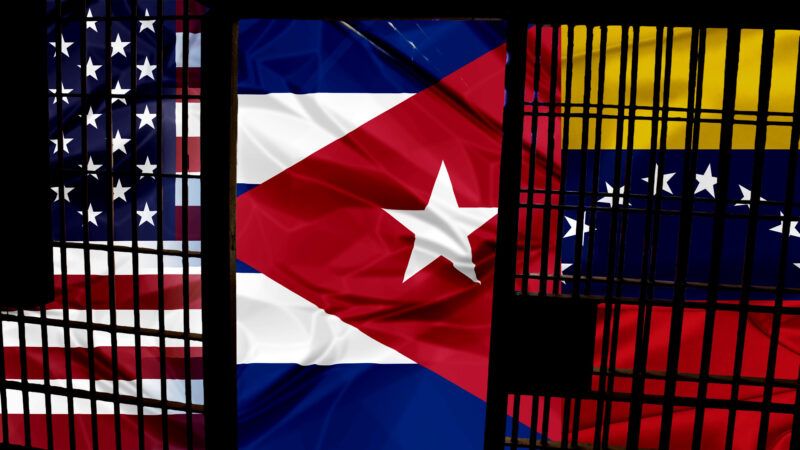They Fled Socialism and Came to the U.S. Legally. Now the Trump Administration Is Trying To Deport Them.
For years, the president has rightly railed against those oppressive regimes. So why is his administration targeting their victims?

President Donald Trump is rarely shy. One topic he has been consistently and especially vocal about during his time in American politics—a high bar to meet—is his opposition to socialism and communism.
"Under my administration, we have taken decisive action to stand with the good people of Cuba and Venezuela," he said during remarks in the East Room at the White House in 2017. "The same failed communist ideology that has brought oppression to Cuba has brought nothing but suffering and misery everywhere and every place it has been anywhere in the world. Communism is the past. Freedom is the future."
Communism should absolutely be a thing of the past. But a recent immigration policy from the Trump administration calls into question how serious it is about allowing people to access the future the president envisions.
Consider the case of M.A.R., a Cuban man who came to the United States legally in 2024. He was a political dissident in Cuba, as outlined in a recent ruling from the U.S. District Court for the District of Columbia, where he faced "threats, harassment, and retaliation from Cuban authorities" for his views. After arriving at the border, he was granted humanitarian parole, obtained a work authorization, and married a U.S. citizen. He has no criminal record.
But when M.A.R. attended an immigration hearing in May of this year, he was detained by Immigration and Customs Enforcement (ICE) officers directly afterward, even though he had met the legal obligations of his parole and his case had not been dismissed at the hearing. He soon found out, according to his attorney, that the government would subject him to expedited removal—a fast-track proceeding with a much less robust process, including no hearing in front of a judge.
That process has typically been limited to people arrested crossing the U.S.-Mexico border. But the Trump administration expanded it in January to apply to humanitarian parolees—who, again, entered the country legally. In doing so, the government exceeded its statutory authority, ruled Judge Jia Cobb of D.C.'s federal district court last week, in a decision that could have major implications for the president's immigration strategy. The ruling temporarily bars the Department of Homeland Security from executing fast-track deportations for the many migrants who were admitted to the U.S. on humanitarian grounds, though the government will appeal.
M.A.R. is just one of "hundreds of thousands of noncitizens…paroled into the United States in recent years after inspection at a port of entry and who now face the threat of removal under highly truncated procedures that have rarely, if ever, been applied at any scale to parolees," writes Cobb.
[They] fled oppressive regimes and perilous conditions in their home countries. They arrived for inspection at the United States border pursuant to procedures created and advocated by the U.S. Government. They were paroled into this country under those procedures and given the chance to prove their claims for asylum or other relief authorized by our laws. In a world of bad options, they played by the rules.
Now, the Government has not only closed off those pathways for new arrivals but changed the game for parolees already here, restricting their ability to seek immigration relief and subjecting them to summary removal despite statutory law prohibiting the Executive Branch from doing so.
The administration sees this as a setback. In light of Trump's own views, it should not.
In that same speech from 2017, Trump singled out another country: "We also stand with the people of Venezuela, who are suffering under the ruthless socialism of the Maduro regime," he said. "We reject socialist oppression, and we call for the restoration of democracy and freedom for the citizens of Venezuela."
Those remarks—which reflect his long-standing antipathy to socialism—are again puzzling in the context of another individual mentioned in the decision, R.J.L.B., a Venezuelan military officer who came to the U.S. legally. The Venezuelan government, he says, is surveilling him and his family. He, too, was arrested this year after an immigration proceeding and set for a fast-track return to Venezuela, notwithstanding that he believes he will be killed for desertion if forced to return. It is a strange way for the Trump administration to "reject socialist oppression."
That is especially true in light of another hallmark Trumpism: For all of his tough talk on immigration, he has frequently emphasized his support for doing it legally. These people came to the U.S. "the right way"—and they did so fleeing the systems Trump has rightly positioned himself against.
In an announcement Thursday, Attorney General Pam Bondi took to video to offer a $50 million reward for information leading to the arrest of Venezuelan President Nicolás Maduro. It almost makes you forget for a moment that the administration's power is not constrained to political theater.


Show Comments (122)